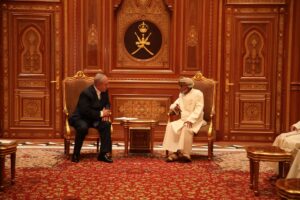(JNS) Oman has opened its airspace to overflights by Israeli airlines, Foreign Minister Eli Cohen announced on Thursday.

“This historic decision will shorten the time of flights from Israel to Asia and lower ticket prices. I thank Prime Minister Benjamin Netanyahu, the National Security Council and the director general of the Foreign Ministry,” said Cohen.
“I thank the Sultan of Oman Haitham bin Tariq Al Said and our American friends for their substantial help in the success of the move,” he added.
The announcement comes after months of talks between the Foreign Ministry and authorities in Oman, and after Saudi Arabia last July announced during U.S. President Joe Biden’s visit to Israel the opening of its airspace to “all carriers,” paving the way for Israeli commercial airlines to overfly the kingdom.
The Saudi move had hitherto proved largely symbolic, as shortening flight times between Israel and countries such as India and China required a similar authorization from Oman.
“The Far East is not so far away and the skies are no longer the limit. This is a day of great news for Israeli aviation. Israel has, in effect, become the main transit point between Asia and Europe,” said Netanyahu on Thursday.
“We have worked to open the airspace, first over Saudi Arabia, and from 2018 when I visited Oman, to add Oman as well so that we can fly directly to India and on to Australia. This was achieved today, after considerable effort, including in recent months. Here is good news—Israel is opening up to the east on an unprecedented scale,” added the prime minister.
In October 2018, Netanyahu made a secret one-day trip to Oman, where he met with then-ruler Sultan Qaboos bin Said.
The visit was a crucial step in expanding relationships with the region’s players while “leveraging Israel’s advantages in security, technology and economic matters,” according to Netanyahu’s office at the time.
“We always thought that if we solved the Palestinian problem, it would open up the doors to peace with the broader Arab world. And that’s certainly true, if you could do it,” said Netanyahu. “But it may mean that equally true and perhaps even truer is that if you open up to the Arab world and you normalize relations with them, it will open the door for an eventual reconciliation and peace with the Palestinians.”
It was the first trip to Oman made by an Israeli prime minister since Shimon Peres did so in 1996.
Neither Oman nor Saudi Arabia has signed onto the Abraham Accords, the Trump administration-brokered agreements that normalized Israel’s relations with the United Arab Emirates, Bahrain, Morocco and Sudan.
However, Netanyahu on Sunday said he was actively courting Riyadh in an effort to persuade it to join in the accords as that would constitute a “quantum leap” towards regional peace.
“Obviously, the next step could be not just another country but a quantum leap in expanding the circle of peace, and I’m talking of course about peace with Saudi Arabia,” Netanyahu continued. “I think that if we can achieve this, maybe through gradual steps, maybe it will take some normalization steps, it will change Israel’s relationship with the rest of the Arab world.
“It will lead to the effective ending of the Israeli-Arab conflict—not the Israeli-Palestinian conflict [but] the Israeli-Arab conflict, and will also help normalize Israel’s relationship with a great part of the Muslim world,” he added.
Earlier this month, Cohen revealed that Israel will sign a broader peace agreement with Sudan later this year in Washington, after he made a “historic diplomatic visit” to Khartoum and met with General Abdel-Fattah al-Burhan, leader of Sudan’s transitional government.
“Today’s visit to Sudan lays the foundation for a historic peace agreement with a strategic Arab and Muslim country,” said Cohen. “The peace agreement between Israel and Sudan will promote regional stability and contribute to the national security of the State of Israel.”
*
Preceding provided by JNS.org